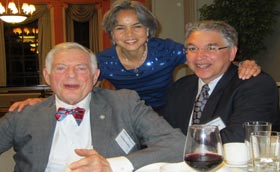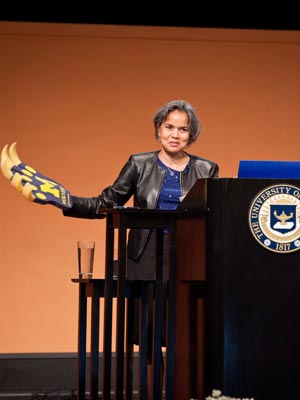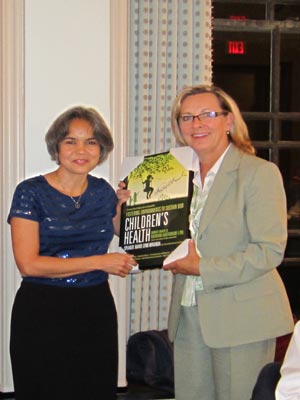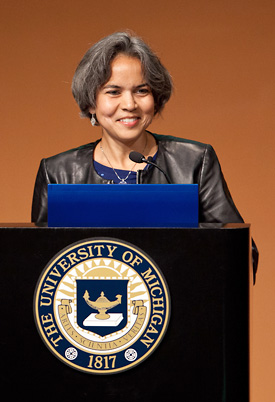Healing lead-poisoning in children with backpacks? According to the new Dean of Michigan’s School of Natural Resources & the Environment, books in a backpack are indeed a good start! And Dean Dr. Marie Lynn Miranda should know. She is an academician and a pediatrician whose research specialty – and passion – is improving environmental health conditions for the disadvantaged, especially children.
Duke University’s loss became Michigan’s gain in January 2012 when Dr. Miranda left her dual posts at Duke as a faculty member in the Nicholas School of Environment and as a physician with the medical school. On March 26, Dean Miranda delivered the 11th annual Peter M. Wege Lecture on Sustainability at her new university. Since the series started in 2001, the University of Michigan’s Wege Lecture has become one of the most popular on campus.
Combining her intellectual strengths, compassion for children, love for family, and sense of humor, Dr. Miranda captivated the crowd adding to the Wege Lecture’s stellar reputation. Dr. Miranda showed graphics on how her research team locates high-risk areas – usually in impoverished neighborhoods – for environmental toxins, including lead. They then collect blood studies of children in the area who have elevated lead levels.
By testing these children, Dr. Miranda found clear evidence of developmental deficits attributed to the lead in their bodies. Children are at greater risk for lead poisoning, Dr. Miranda explained, “because they are not little adults.”
They crawl on the ground, put things in their mouths, and have higher metabolisms causing them to breathe more air and drink more water per pound than adults. That’s why children are more vulnerable to environmental toxins like lead that can diminish their ability to learn.
The positive news, according to Dr. Miranda’s results, is that an enriched environment can help mediate the mental deficits caused by ingesting lead. And that is where the backpacks come in. Working with the schools and teachers, Dr. Miranda’s team visits the children affected by lead poisoning. They give each child a bright new backpack filled with what Dr. Miranda calls “really good books” along with a library-card application.
Miranda’s team also puts in a growth chart for the parents so they can track their child’s developmental progress. This information enables the parents to get help if they see signs of developmental slowing.

To read more on this event please visit : Peter M. Wege Lecture on Sustainability



